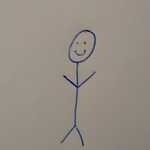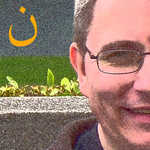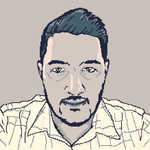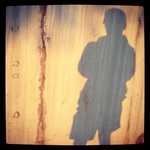I rather like the above photo taken recently on our travels in Southern California. It shows a friend’s backyard. But to post it on Hi.co, I need something to write about. Unfortunately, I know little about cacti or cycads. I have even less to say about swimming pools, though sometimes I secretly yearn to have my own place to take a dip. So, what’s to say about backyards?
It seems unlikely that Wikipedia would have an entry on backyards, but it does.
A back yard (or backyard) is a yard at the back of a house, common in suburban developments in the Western world.
It gets even better. After a brief discussion of how yards allow vegetable gardening and affect land values, we read:
The back area is known as the back yard. The front area is known as the front yard.
I’m really enjoying this,
Depending on the size of the back yard, it may have any number of items (or none), such as: Barbecue; Buildings such as: barn,[2] chicken coop, garage, gazebo,[2] guest house, outhouse, playhouse,[2] sauna, shed,[2] smokehouse, workshop, etc.; Compost bin[2]; Decking; Fencing; Garden; Garden furniture (bench, patio table and chairs, umbrella, etc.); Landscaping with or without a lawn or just dirt; Renewable energy generator (solar panels, windmills, etc); Playground equipment (sandbox, slide, swingset, etc); Storage tank; Swimming pool and/or hot tub; Vehicle; Waste container;
There’s even more really fun stuff. If you enjoy this sort of thing as much as I do, then look up the Wikipedia entry for yourself, especially the section on Australia (which I promise I didn’t write). Oh, and I should mention that there’s an excellent picture of an actual backyard in Harvey, Louisiana.
I am a great fan of Wikipedia and am appalled at how much flak it takes from some teachers, academics and librarians that often want and expect the truth, and nothing but the truth, from their general reference sources. Indeed, how wonderful it would be if mankind had such a fountain of undisputed and unvarnished truth that we could turn on and off at will. No encyclopedia can do that.
Because of its social media format, Wikipedia has a degree of vulnerability to trolls, pranksters and ideologues of all stripes. Furthermore, Wikipedia has produced occasional howlers, some biased comments, and plenty of accurate but inadequate or incomplete entries. I’ll give my defense of Wikipedia a little later, but first it may be useful to take a quick look at the history of encyclopedias. (I know that last line is likely to scare people off, but I just think of it as separating the sheep from the goats. ;=})
The story of the encyclopedia begins with mankind’s first attempts to store (i.e. record) accumulated knowledge and to enable its transmission across space and time, across empires and generations. This deep-seated impulse can be found coming to fruition in all the earliest civilizations, both in the Old World and, at about the same time, in the so-called New World.1 We see evidence of this, for example, with the Ancient Mayans, Egyptians, Chinese and Europeans; however, a Roman, Pliny the Elder, is the person most often credited with attempting the first written compilation of ‘reliable’ knowledge: Naturalis Historia (AD 77-79).
One of my favorite relatively modern examples of the knowledge compendium is a remarkable work by the Quechua native Guáman Poma, Nueva corónica y buen gobierno (1615). Almost 1200 pages long, including 791 pages of text and 398 full page drawings, the bound volume encompasses the entire history of the Inka empire with aspects of global history as well, including such diverse elements as precise pictures of agricultural techniques and implements; extensive Catholic moral discourses; details of the social, economic, and political administration of the enormous pre-Columbian empire; maps; accounts of the every day life of the Quechua peoples; vivid pictures of Spanish atrocities; satyrical moments; juridical dispositions; all of this brought together into a single structure, the whole constituting a full fledged “critique of the colonialist discourse of religion, political theory, and history.” 2
The birth of the modern encyclopedia came one hundred years later with such volumes as John Harris’s Lexicon Technicum (1704); The Gujin Tushu Jicheng (1726), a major Chinese encyclopedia, compiled by Chen Menglei; Robert and William Chambers’s Universal Dictionary of Arts and Sciences (1728); and the Encyclopédie (1751) of Denis Diderot.
During the following century, science became a profession with many disciplines, and the era of expertise had begun. This called for a new approach to encyclopedias. Instead of relying on individual scholars of reputation, the nineteenth century saw the deployment of dozens, even hundreds, of experts in the various subjects covered by each individual reference work.
I’m going to break here. Wikipedia’s defense can wait till the next sketch!
-
I have written on this subject. See “Knowledge Systems of Indigenous America” in the Encyclopedia of the History of Science in Non-Western Cultures, edited by Helaine Selin ↩
Other moments in Los Angeles
-
los Angeles, gratitude, Growing Up
Happy (belated) birthday, L.A.
in Los Angeles, United States -
Job Corps
in Los Angeles, United States -
SCHARP
in Los Angeles, United States -
Homeless Identity
in Los Angeles, United States -
Share
in Los Angeles, United States -
Planet Fitness Downtown L.A.
in Los Angeles, United States -
California Science Center Blogging
in Los Angeles, United States -
Mac Arthur Park Crypto Jew Worship.
in Los Angeles, United States -
A day in the life
The days of the week always feel different. Sometimes, Thursdays feel like Fridays, and Sundays are too short.
in West Hollywood, United States












